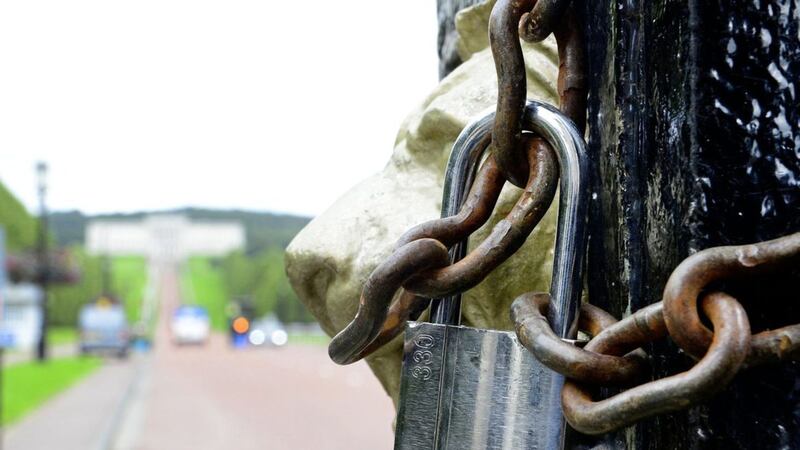NOBODY has made a case for the slumbering Stormont. What happens to electoral politics when it has no forum?
Or, rather, none that is local and responsive, recognisably worth the bother to people who want to vote and the many times fewer people who want to compete for their votes?
The demoralising thought is that this was what happened during the worst of the Troubles.
Here it comes again, a sense of 'what's the point?' The last time politics was beset to such a degree was when people were wiring bombs under roads and in ditches, throwing them into pubs, killing soldiers, policemen, taxi drivers.
In that atmosphere of dread, who could believe in the business of selecting candidates, getting votes? Or in the basic political dynamic of changing anything for the better by argument?
The SDLP leadership did, and John Hume wore himself out lifting the entire conundrum out of and above the stagnant local field.
But for a very long time there has been no such power-house, drawing on Dublin foreign affairs skills, EU resources. Dublin's relationship with northern nationalists of all stripes is now very different.
The latest manoeuvring in Westminster will at best make a second referendum more likely; probably, though best guesses are more than usually flimsy guesswork since normal service is de-railed by Brexit - which, as one of the calmest observers puts it, has "suspended, distorted or inverted the laws of political physics". Another, less cool, sees the House of Commons as reduced to "rubble".
The alliance of Jeremy Corbyn, the DUP and Jacob Rees-Mogg's aptly-named ERG was not the first example the Observer's Andrew Rawnsley chose to illustrate his inverted world, though the comments he and others make suggest they find the combination too weird to consider for long.
On Sunday he thought defeat in a vote would not make Theresa May quit "because her authority has been shattered multiple times already".
He also reckoned that quitting would be out of character for May: "Walking away from messes of their own creation is what juvenile males like David Cameron and Boris Johnson do."
Bang on cue, Boris appeared on screen with pink tie as long as one of Trump's, mannerisms muted, hair shorn.
Presumably for the crisis of his own ambition; his and Rees-Mogg's recent performances have them both sagging like punctured balloons, credibility gone as leaders at least inside Westminster.
Prompted by a question, Johnson said he feels a deep sense of responsibility. How would he know what responsibility feels like?
Michael Gove may have done something right with that act of treachery. The pettiness of Conservative infighting, personal ambition squashing serious thought about EU membership, could only have been so much worse with Boris as PM.
Bad enough as it is, with the unimpressive Dominic Raab, Esther McVey, Amber Rudd apparently flirting with running for the top job.
One bit of this territory is familiar here; the unionist stonewalling on their interpretation of what is right and essential, regardless of anyone else.
What it does to their sense of themselves to be lined up alongside Corbyn, Marxist fellow-travelling IRA-lover of their nightmares, is only slightly stranger to contemplate than how they, and Corbyn, enjoy being shoulder to pin-striped shoulder with Rees-Mogg.
Perhaps unionists whisper to themselves 'don't look down, just keep on saying no'.
There is another odd combo on the scene. Behold northern Sinn Féin shoulder to shoulder with Alliance, the tiny Green Party, the SDLP's struggling leader.
The odd one out is Sinn Féin. Nobody, except perhaps themselves, has ever figured mainstream republicans as a harmonising, constructive presence.
But lined up by bemused telly-people outside Westminster, Michelle O'Neill behaves with a grace her Dublin leader may have mislaid while Colum Eastwood makes their joint case for the May deal with an authority hard to watch, knowing the state of his party.
Local stage or not, the electioneering mechanics crank on. Headless chicken stuff or valiant effort?
The latest RHI revelations show one of the smartest Sinn Féin spads scrabbling to maintain that wall of unknowing around the departed Martin McGuinness.
O'Neill returns to SF form in sharp tweets about McGuinness's undeniable probity. Máirtín Ó Muilleoir has to explain away his Romanian connection.
The party vote next time out ought to show damage, like that of the DUP.
But Barry McElduff wants to run in next year's council poll, personal vote probably little damaged.
Local standing lasts if well tended, and the unpredictable vista opened by Brexit will sustain the most basic allegiances.








